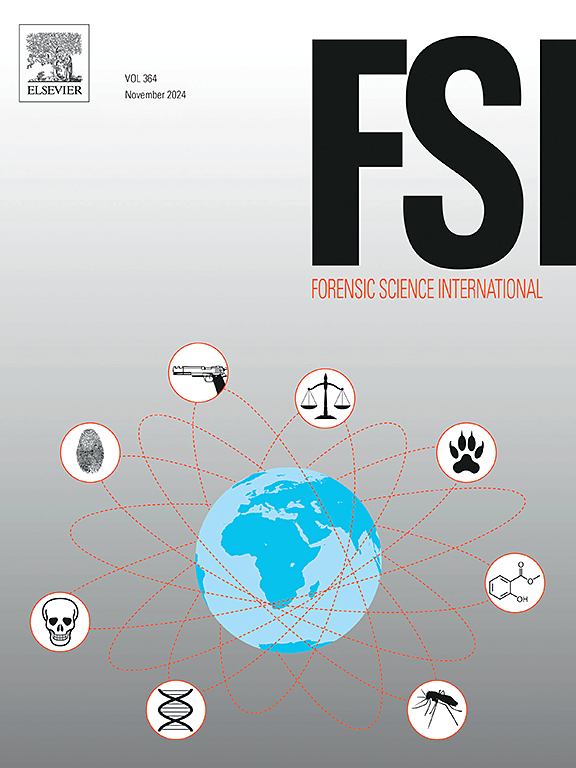Do migrants better in reintegration? A multicenter follow-up study on re-delinquency, addiction-related behavior and resocialization after German Forensic Addiction Treatment
IF 2.2
3区 医学
Q1 MEDICINE, LEGAL
引用次数: 0
Abstract
In Germany, Forensic Addiction Treatment serves the purpose of reintegration into society. Patients with a migration background are over-represented, show slightly higher rates of premature termination and exhibit less successful outcomes. However, outcome research was often limited by conceptual ambiguities and insufficient control for confounding variables. In the present article, we defined reintegration as a comprehensive concept comprising three domains (re-delinquency, addiction-related behavior, resocialization). In a multicenter approach, 466 migrant patients were compared on 35 catamnestic variables to a group of non-migrants matched on the variables sex, main offense, main diagnostic group and age at discharge. For to seek evidence for and against interrelation, we applied both inferential and Bayesian statistics. Both groups show almost the same substance use behaviors and identical re-delinquency rates, with some tendency toward more serious re-offenses among non-migrants. The migrant-group combines more favorable patterns on relevant indicators of resocialization. However, while treatment is proving equally successful in terms of its core purpose of reintegration, it does not succeed in overcoming systemic barriers to accessing the general health care system, as migrants show more reluctant help-seeking behaviors. This, in turn, could increase the risk of long-term re-delinquency due to a lack of adequate post-forensic support. Hence, barriers should be reduced and treatment offers should be adapted to migrants’ needs.
移民能否更好地融入社会?德国法医学成瘾治疗后再犯罪、成瘾相关行为及再社会化的多中心随访研究。
在德国,法医成瘾治疗服务于重新融入社会的目的。具有移民背景的患者比例过高,早产率略高,成功率较低。然而,结果研究经常受到概念模糊和对混杂变量控制不足的限制。在本文中,我们将重返社会定义为一个综合概念,包括三个领域(再犯罪,成瘾相关行为,再社会化)。在一项多中心方法中,466名移民患者与一组非移民患者在35个动态变量上进行了比较,这些变量在性别、主要罪行、主要诊断组和出院年龄上匹配。为了寻找支持和反对相互关系的证据,我们同时应用了推理统计和贝叶斯统计。这两个群体表现出几乎相同的药物使用行为和相同的再犯罪率,非移民群体有更严重的再犯罪趋势。移民群体在重新社会化的相关指标上结合了更有利的模式。然而,尽管治疗在实现重返社会这一核心目标方面取得了同样的成功,但由于移徙者表现出更不愿意寻求帮助的行为,治疗未能成功克服进入一般卫生保健系统的系统性障碍。反过来,由于缺乏足够的法医后支持,这可能会增加长期再犯罪的风险。因此,应减少障碍,提供的治疗应适应移徙者的需要。
本文章由计算机程序翻译,如有差异,请以英文原文为准。
求助全文
约1分钟内获得全文
求助全文
来源期刊

Forensic science international
医学-医学:法
CiteScore
5.00
自引率
9.10%
发文量
285
审稿时长
49 days
期刊介绍:
Forensic Science International is the flagship journal in the prestigious Forensic Science International family, publishing the most innovative, cutting-edge, and influential contributions across the forensic sciences. Fields include: forensic pathology and histochemistry, chemistry, biochemistry and toxicology, biology, serology, odontology, psychiatry, anthropology, digital forensics, the physical sciences, firearms, and document examination, as well as investigations of value to public health in its broadest sense, and the important marginal area where science and medicine interact with the law.
The journal publishes:
Case Reports
Commentaries
Letters to the Editor
Original Research Papers (Regular Papers)
Rapid Communications
Review Articles
Technical Notes.
 求助内容:
求助内容: 应助结果提醒方式:
应助结果提醒方式:


